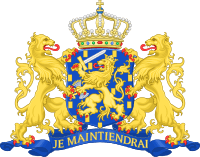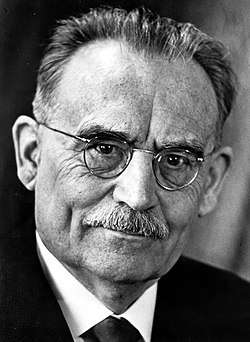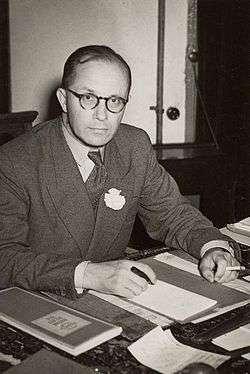Third Drees cabinet
The Third Drees cabinet, also called the Fourth Drees cabinet[1] was the cabinet of the Netherlands from 13 October 1956 until 22 December 1958. The cabinet was formed by the political parties Labour Party (PvdA), Catholic People's Party (KVP), Anti-Revolutionary Party (ARP) and the Christian Historical Union (CHU) after the election of 1956. The grand coalition (Roman/Red) cabinet was a majority cabinet in the House of Representatives.[2]
| Third Drees cabinet Fourth Drees cabinet | |
|---|---|
46th Cabinet of the Netherlands | |
  The first meeting of the incoming Third Drees cabinet on 12 October 1956 | |
| Date formed | 13 October 1956 |
| Date dissolved | 22 December 1958 (Demissionary from 11 December 1958) |
| People and organisations | |
| Head of state | Queen Juliana |
| Head of government | Willem Drees |
| Deputy head of government | Teun Struycken |
| No. of ministers | 14 |
| Total no. of members | 16 |
| Member party | Labour Party (PvdA) Catholic People's Party (KVP) Anti-Revolutionary Party (ARP) Christian Historical Union (CHU) |
| Status in legislature | Grand coalition (Roman/Red) |
| Opposition party | People's Party for Freedom and Democracy |
| Opposition leader | Pieter Oud |
| History | |
| Election(s) | 1956 election |
| Outgoing election | 1959 election |
| Legislature term(s) | 1956–59 |
| Incoming formation | 1956 formation |
| Outgoing formation | 1958 formation |
| Predecessor | Second Drees cabinet |
| Successor | Second Beel cabinet |
 |
|---|
| This article is part of a series on the politics and government of Netherlands |
|
|
Local government
|
|
Related topics |
Formation
The cabinet formation took 4 months. This was the longest and most difficult formation the Netherlands had ever seen, partly as a result of the rising tensions between the Labour Party and the Catholic People's Party. Also after the formation, these tensions kept rising, leading to the fall of the cabinet in December 1958. Root of the tensions were the decision of the Roman Catholic Church to excommunicate Catholic socialists from the church. Nearly 100% of the south of the Netherlands used to vote for the Catholic People's Party for decades, but in the 1950s secular political parties got an increase in votes. The excommunication had the result of social exclusion in cities and villages which used to be solidly Catholic blocks. Protestants in the north supported the Catholics.
Term
After considerable growth after World War II, the rising wages, combined with lowered taxes, now led to overspending, which endangered the export. In reaction, wages and government spending were both lowered.
Rising tension with Indonesia, mostly about New Guinea, came to a climax when Indonesia nationalised Dutch properties in the country. The Dutch were supposed to leave entirely.
Other international problems were the Suez Crisis and the Hungarian revolt, which led to monetary and economic problems. The threat of an oil crisis as a result of the Suez crisis led to the installation of car-free Sundays. The suppression of the Hungarian revolution by the USSR led to plundering of communist institutions. Several thousands of Hungarian refugees were accepted into the Netherlands and welcomed in Dutch homes.
On 1 January 1957, the state pension AOW after the age of 65, that was proposed during the former cabinet Drees II, was installed. This resulted from a previous emergency law by Drees, and is the one thing he is remembered for most.
Cabinet Members
| Ministers | Title/Ministry | Term of office | Party | |||
|---|---|---|---|---|---|---|
 |
Dr. Willem Drees (1886–1988) |
Prime Minister | General Affairs | 7 August 1948 – 22 December 1958 [Retained] |
Labour Party | |
.jpg) |
Ko Suurhoff (1905–1967) |
Minister | Interior | 13 October 1956 – 29 October 1956 [Ad interim] |
Labour Party | |
 |
Teun Struycken (1906–1977) |
Interior, Property and Public Sector Organisations |
29 October 1956 – 19 May 1959 |
Catholic People's Party | ||
| Deputy Prime Minister | ||||||
.jpg) |
Dr. Joseph Luns (1911–2002) |
Minister | Foreign Affairs | 13 October 1956 – 6 July 1971 |
Catholic People's Party | |
.jpg) |
Henk Hofstra (1904–1999) |
Minister | Finance | 13 October 1956 – 22 December 1958 |
Labour Party | |
.jpg) |
Dr. Ivo Samkalden (1912–1995) |
Minister | Justice | 13 October 1956 – 22 December 1958 |
Labour Party | |
.jpg) |
Dr. Jelle Zijlstra (1918–2001) |
Minister | Economic Affairs | 2 September 1952 – 19 May 1959 [Retained] |
Anti-Revolutionary Party | |
 |
Kees Staf (1905–1973) |
Minister | War | 15 March 1951 – 19 May 1959 [Retained] |
Christian Historical Union | |
| Navy | ||||||
.jpg) |
Ko Suurhoff (1905–1967) |
Minister | Social Affairs and Health | 2 September 1952 – 22 December 1958 [Retained] |
Labour Party | |
 |
Jo Cals (1914–1971) |
Minister | Education, Arts and Sciences |
2 September 1952 – 7 November 1961 [Retained] |
Catholic People's Party | |
.jpg) |
Jacob Algera (1902–1966) |
Minister | Transport and Water Management |
2 September 1952 – 10 October 1958 [Retained] [Res] |
Anti-Revolutionary Party | |
.jpg) |
Herman Witte (1909–1973) |
10 October 1958 – 1 November 1958 [Ad interim] |
Catholic People's Party | |||
.jpg) |
Jan van Aartsen (1909–1992) |
1 November 1958 – 19 May 1959 |
Anti-Revolutionary Party | |||
.jpg) |
Dr. Sicco Mansholt (1908–1995) |
Minister | Agriculture, Fisheries and Food Supplies |
25 June 1945 – 1 January 1958 [Retained] [Appt] |
Labour Party | |
 |
Kees Staf (1905–1973) |
1 January 1958 – 13 January 1958 [Ad interim] |
Christian Historical Union | |||
 |
Dr. Anne Vondeling (1916–1979) |
13 January 1958 – 22 December 1958 |
Labour Party | |||
.jpg) |
Herman Witte (1909–1973) |
Minister | Housing and Construction |
2 September 1952 – 19 May 1959 [Retained] |
Catholic People's Party | |
 |
Dr. Marga Klompé (1912–1986) |
Minister | Social Work | 13 October 1956 – 24 July 1963 [Retained] |
Catholic People's Party | |
 |
Kees Staf (1905–1973) |
Minister | Colonial Affairs | 18 July 1956 – 16 February 1957 [Retained] [Ad interim] |
Christian Historical Union | |
.jpg) |
Gerard Helders (1905–2013) |
16 February 1957 – 19 May 1959 |
Christian Historical Union | |||
| State Secretaries | Title/Portfolio/Ministry | Term of office | Party | |||
 |
Norbert Schmelzer (1921–2008) |
State Secretary | • Privatization Policy • Government Real Estate • Public Sector Organisations (within Interior, Property and Public Sector Organisations) |
29 October 1956 – 19 May 1959 |
Catholic People's Party | |
 |
Ernst van der Beugel (1918–2004) |
State Secretary | • European Affairs • NATO Affairs • Benelux Affairs • International Aviation Policy (within Foreign Affairs) |
8 January 1957 – 22 December 1958 |
Labour Party | |
.jpg) |
Dr. Gerard Veldkamp (1921–1990) |
State Secretary | • Small Business Policy • Retail Policy • Competition Policy • Tourism Affairs (within Economic Affairs) |
10 October 1952 – 17 July 1961 [Retained] |
Catholic People's Party | |
.jpg) |
Ferdinand Kranenburg (1911–1994) |
State Secretary | • Army • Air Force (within Defence) |
1 June 1951 – 1 June 1958 [Retained] [Res] |
Labour Party | |
 |
Meine van Veen (1893–1970) |
25 October 1958 – 22 December 1958 |
Labour Party | |||
 |
Harry Moorman (1899–1971) |
• Navy (within Navy) |
1 May 1949 – 19 May 1959 [Retained] |
Catholic People's Party | ||
.jpg) |
Dr. Aat van Rhijn (1892–1986) |
State Secretary | • Social Security • Unemployment Affairs • Occupational Safety • Social Services • Poverty Policy • Elderly Policy • Disability Affairs • Veteran Affairs • Minority Affairs • Medical Ethics Policy (within Social Affairs and Health) |
15 February 1950 – 22 December 1958 [Retained] |
Labour Party | |
.jpg) |
Dr. Anna de Waal (1906–1981) |
State Secretary | • Primary Education • Secondary Education • Special Education (within Education, Arts and Sciences) |
2 February 1953 – 16 March 1957 [Retained] [Res] |
Catholic People's Party | |
 |
René Höppener (1903–1983) |
• Youth Policy • Environmental Policy • Nature Policy • Media Affairs • Culture Policy • Arts Policy • Recreation Affairs • Sport (within Education, Arts and Sciences) |
12 November 1956 – 19 May 1959 |
Catholic People's Party | ||
| Source: (in Dutch) Rijksoverheid | ||||||
- Retained Retained this position from the previous cabinet.
- Res Resigned.
- Ad interim Served ad interim.
- Appt Appointment: Sicco Mansholt appointed European Commissioner.
References
- According to a different numbering this was the Fourth Drees cabinet because it was the fourth cabinet with Willem Drees as Prime Minister.
- "Coalities tussen sociaaldemocraten en confessionelen" (in Dutch). Historisch Nieuwsblad. 10 August 2006. Retrieved 24 April 2018.
External links
- Official
- (in Dutch) Kabinet-Drees IV Parlement & Politiek
- (in Dutch) Kabinet-Drees III Rijksoverheid
| Wikimedia Commons has media related to Cabinet Drees III. |